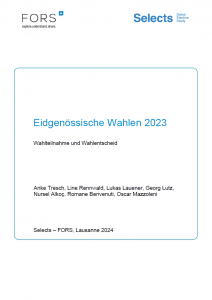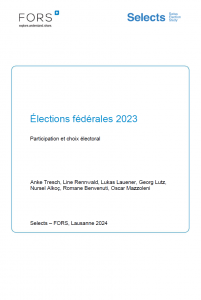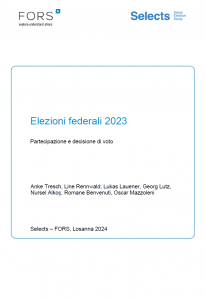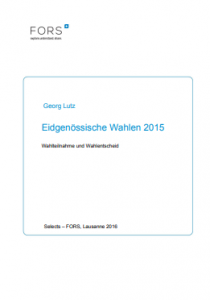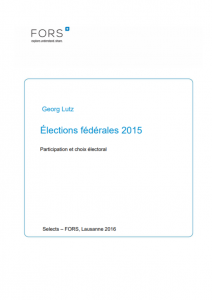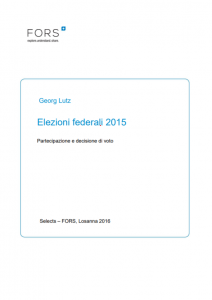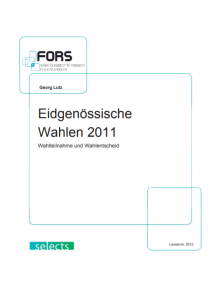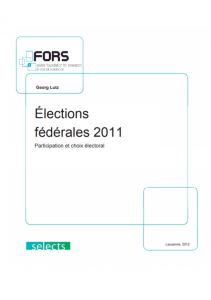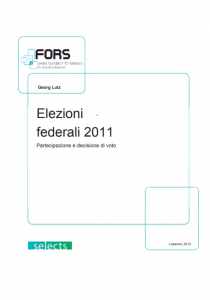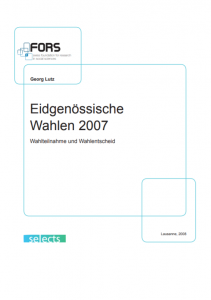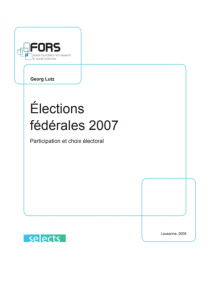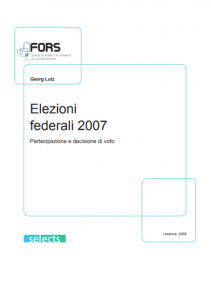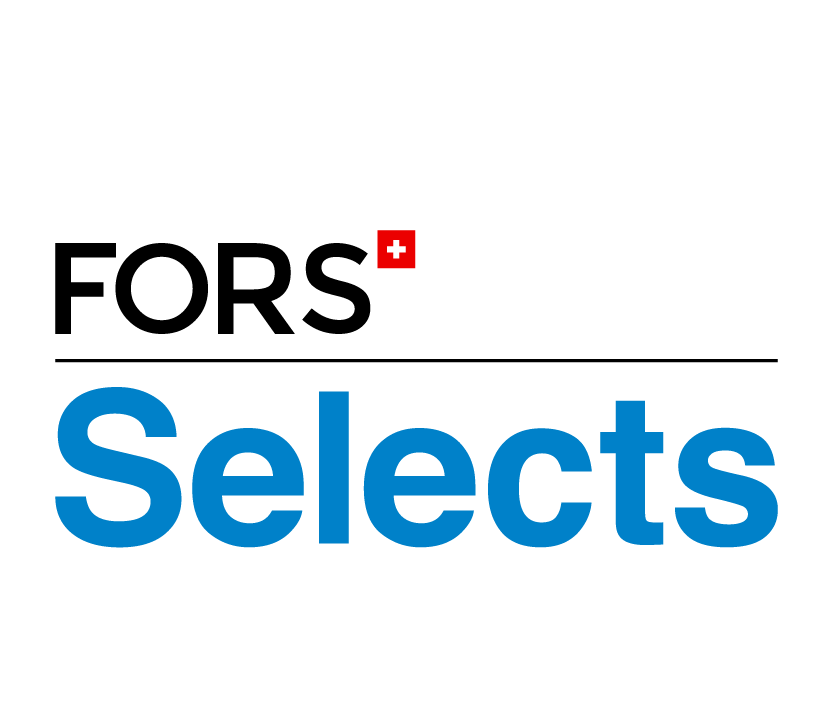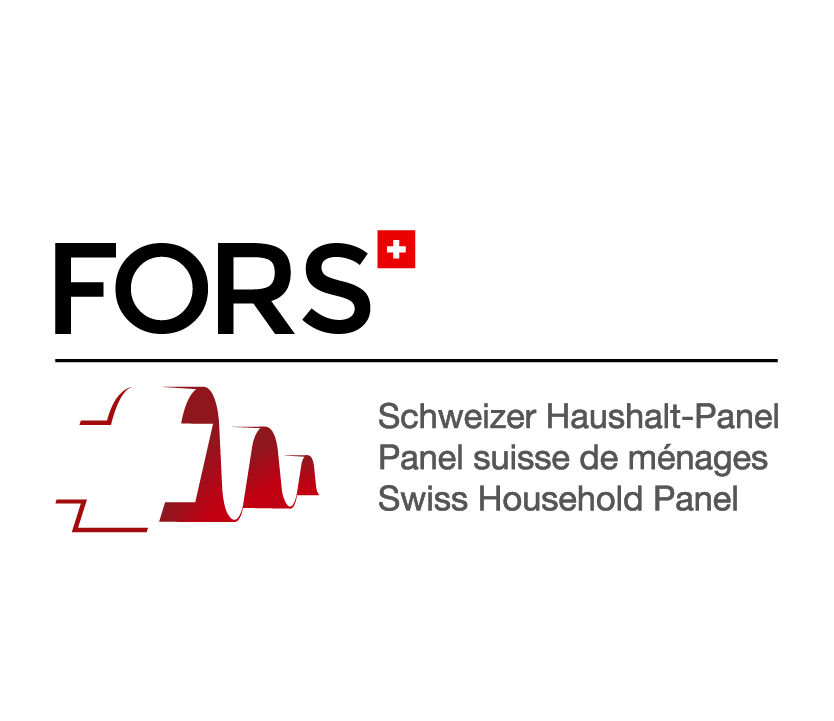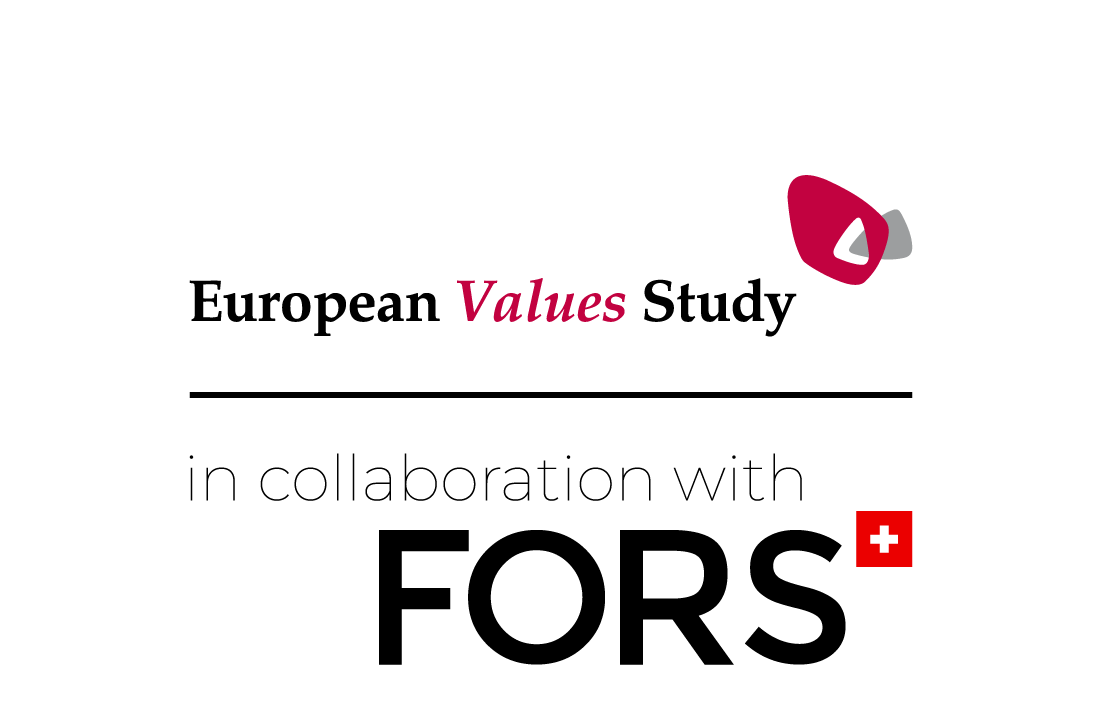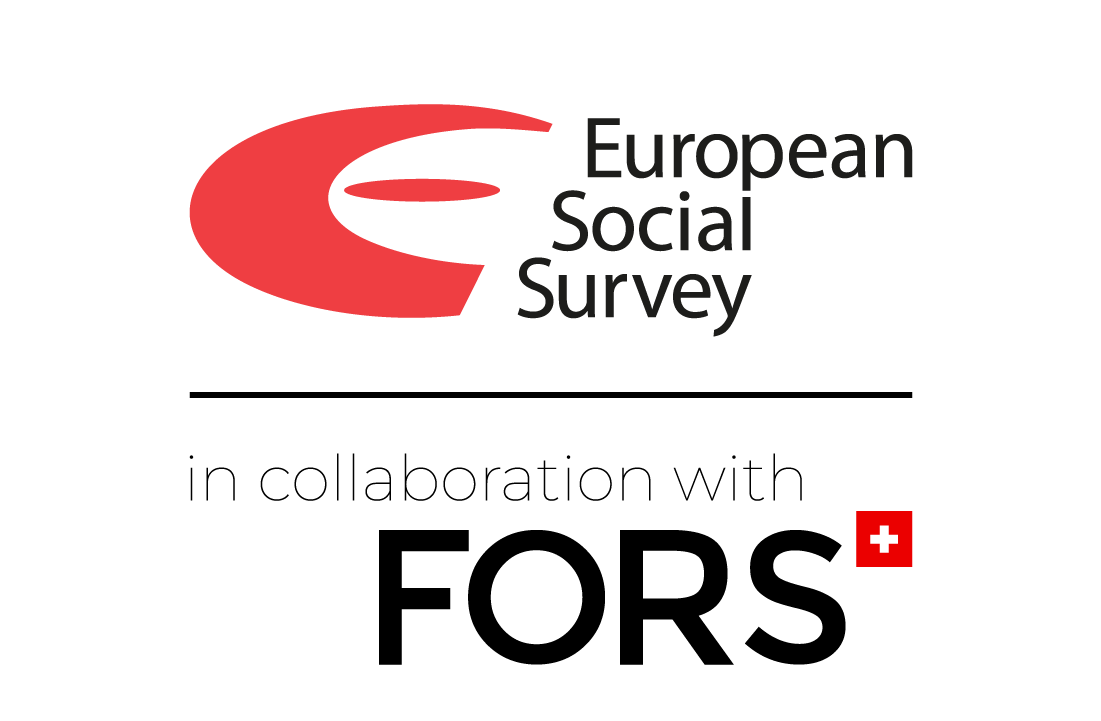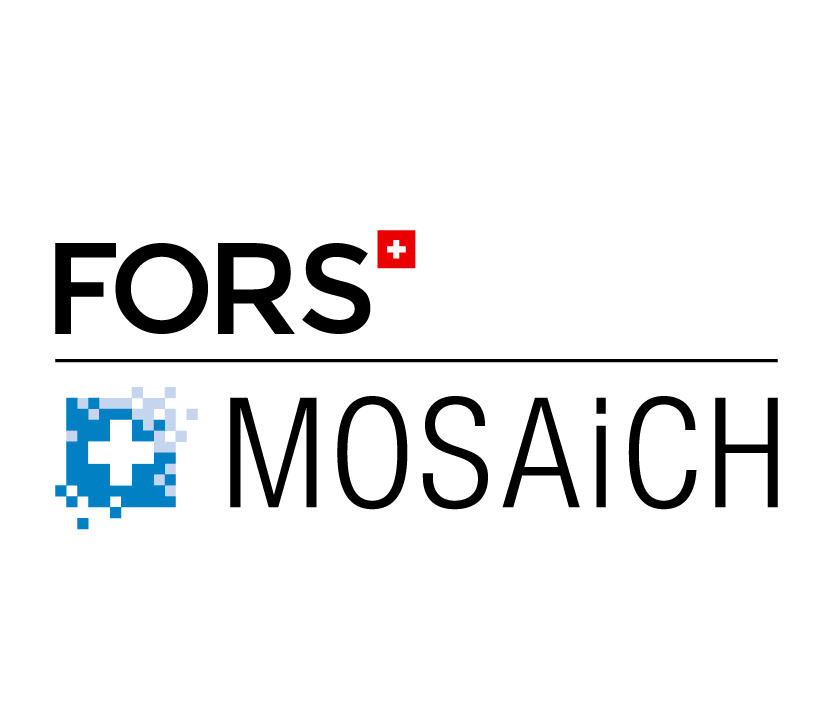Political participation and public opinion
Recent publications from FORS on political participation and public opinion
National Elections. Lutz Georg, Tresch Anke, 2023/12/18. pp. 391-409 dans The Oxford Handbook of Swiss Politics, Oxford University Press. [DOI][serval:BIB_7737F34A4768]
Direct-Democratic Votes. Sciarini Pascal, Tresch Anke, 2023/12/18. pp. 410-429 dans The Oxford Handbook of Swiss Politics, Oxford University Press. [DOI][serval:BIB_75266612DCFE]
The existing electoral support for social democratic parties. Rennwald Line, 2023/12/08. Renewal, 31 (4) pp. 18-21. [serval:BIB_DF8270621A39]
Editorial: The future of democracy. Rapeli Lauri, Jäske Maija, Lindholm Annika, 2023/11/17. Frontiers in Political Science, 5. Peer-reviewed. [URN][DOI][serval:BIB_AFC20E7F93EA]
Wahlen 2023: Nur sieben Neue schnitten besser als Bisherige ab. Georg Georg, 2023/10/30. DeFacto. [serval:BIB_39D119179239]
Mitte als Mehrheitsbeschafferin gestärkt. Lutz Georg, 2023/10/23. DeFacto. [serval:BIB_20ACEBBDD9EE]
Does it pay to think about the future? Future orientation, ideology, age and vote earning among political candidates. Lindholm Annika, Rapeli Lauri, von Schoultz Åsa, 2023/10/09. International Political Science Review. Peer-reviewed.
[URN][DOI][serval:BIB_6C32DF60C2B5]
Die Kandidierenden- und Listenflut 2023. Lutz Georg, 2023/09/07. DeFacto. [serval:BIB_76DB9A537581]
Frau Rennwald, ist die SVP die Partei der Arbeiterschaft? Rennwald Line, 2023/09/05. DeFacto. [URN][serval:BIB_3964C40A53C2]
Madame Rennwald, l’UDC est-elle le parti des travailleurs ?. Rennwald Line, 2023/09/05. DeFacto. [URN][serval:BIB_AE3DEAB4D0DA]
Political interest in Swiss probability-based political and social surveys. Alkoç Nursel, 2023/08/29., FORS. [URN][serval:BIB_62597CFFF207]
La chute de l’identification partisane en Suisse. Tresch Anke, Rennwald Line, Lauener Lukas, 2023/07/04. Le Temps. [URN][serval:BIB_66A61C78DE12]
L’évolution des identifications partisanes en Suisse 1971-2019. Tresch Anke, Rennwald Line, Lauener Lukas, 2023/07/04. Social Change in Switzerland 34. Peer-reviewed.
[URN][DOI][serval:BIB_651771C7D954]
Die Entwicklung der Parteibindungen in der Schweiz 1971-2019. Tresch Anke, Rennwald Line, Lauener Lukas, 2023/07/04. Social Change in Switzerland 34. Peer-reviewed. [URN][DOI][serval:BIB_D6FE1778E1F1]
Union Membership and Electoral Demand for Redistribution among Left-authoritarians. Rennwald Line, Mosimann Nadja, 2023/02/27. Unequal Democracies Working Paper 37. [URN][serval:BIB_41BA7DACFB9C]
Waar zijn de sociaaldemocratische kiezers gebleven? Bremer Björn, Rennwald Line, 2023/02/13. Samenleving & Politiek [Society & Politics], 30 (2). [URN][serval:BIB_0329747F06E0]
National Populism and Borders: The Politicisation of Cross-border Mobilisations in Europe. Mazzoleni Oscar, Biancalana Cecilia, Pilotti Andrea, Bernhard Laurent, Yerly Grégoire, Lauener Lukas, 2023/01/13. New Horizons in European Politics series 244, Edward Elgar Publishing. [DOI][serval:BIB_13D6B70849B9]
Direct democracy, border residence and Euroscepticism: evidence from a proposition to terminate the free movement of persons between Switzerland and the European Union. Bernhard Laurent, Lauener Lukas, 2023/01/13. pp. 143-164 dans Mazzoleni Oscar, Biancalana Cecilia, Pilotti Andrea, Bernhard Laurent, Yerly Grégoire, Lauener Lukas (eds.) National Populism and Borders: The Politicisation of Cross-border Mobilisations in Europe chap. 8, Edward Elgar Publishing. [DOI][serval:BIB_8ECF3770DE7B]
Breaking down public opinion on European integration: the role of national borders. Lauener Lukas, 2023/01/13. pp. 119-142 dans Mazzoleni Oscar, Pilotti Andrea, Biancalana Cecilia, Bernhard Laurent, Yerly Grégoire, Lauener Lukas (eds.) National Populism and Borders: The Politicisation of Cross-border Mobilisations in Europe chap. 7, Edward Elgar Publishing. [DOI][serval:BIB_C40562527FA4]
What drives elite opinions on European integration? Examining the territorial dimension. Lauener Lukas, Bernhard Laurent, 2023/01/13. pp. 96-118 dans Mazzoleni Oscar, Biancalana Cecilia, Pilotti Andrea, Bernhard Laurent, Yerly Grégoire, Lauener Lukas (eds.) National Populism and Borders: The Politicisation of Cross-border Mobilisations in Europe chap. 6, Edward Elgar Publishing. [DOI][serval:BIB_F657B12C5B7C]
Is the unhappy citizen a populist citizen? Linking subjective well-being to populist and nativist attitudes. Lindholm Annika, Rapeli Lauri, 2023/01/12. European Political Science Review 15 pp. 465-481. Peer-reviewed. [URN][DOI][serval:BIB_2F949513E7F8]
The Swiss neighbourhood index of socioeconomic position: update and re-validation. Panczak Radoslaw, Berlin Claudia, Voorpostel Marieke, Zwahlen Marcel, Egger Matthias, 2023/01/12. Swiss Medical Weekly, 153 (1) p. 40028. Peer-reviewed. [URN][DOI][Pmid][serval:BIB_CA99F6D9EA2F]
Who still likes social democracy? The support base of social democratic parties reconsidered. Bremer Björn, Rennwald Line, 2023. Party Politics, 29 (4) pp. 741-754. Peer-reviewed. [URN][DOI][serval:BIB_4AC79ABB9F55]
Labour Market Transitions in South Africa and Indonesia: A descriptive analysis using panel data. Vaccaro Giannina, Orsholits Dan, Setyonaluri D., Aryaputr C., Zizzamia Rocco, Steinmetz Stephanie, Studer Matthias, Vandecasteele Leen, 2023., Joint EU-ILO Project “Building Partnerships on the Future of Work”. Geneva: ILO / European Commission. [URN][serval:BIB_0AC2B69E0AD1]
Les élites bancaires suisses : entre localisme et transnationalisme. Araujo Pedro, Bühlmann Felix, 2023. Revue française de sociologie, 64 (1-2) pp. 85-110. Peer-reviewed. [URN][WoS][serval:BIB_CD04060A9F6D]
Soziale Verantwortung in der Politik – globale Kompetenz des Staates? Ochsner Michael, 2023. pp. 1-22 dans Handbuch Globale Kompetenz, Springer Fachmedien Wiesbaden. [URN][DOI][serval:BIB_B00A75557333]
The Normalization of Swiss Drug Policies. Pollien Alexandre, 2023. International Journal on Criminology, 10 (2).
[DOI][serval:BIB_3D15E60766E1
For all scientific publications by FORS collaborators see here.
The VOTO studies are published in German, French and Italian
VOTO Studie zur eidgenössischen Volksabstimmung vom 27. September 2020
VOTO Studie zur eidgenössischen Volksabstimmung vom 9. Februar 2020
VOTO Studie zur eidgenössischen Volksabstimmung vom 19. Mai 2019
VOTO Studie zur eidgenössischen Volksabstimmung vom 10. Februar 2019
VOTO Studie zur eidgenössischen Volksabstimmung vom 25. November 2018
VOTO Studie zur eidgenössischen Volksabstimmung vom 23. September 2018
VOTO Studie zur eidgenössischen Volksabstimmung vom 10. Juni 2018
VOTO Studie zur eidgenössischen Volksabstimmung vom 4. März 2018
VOTO Studie zur eidgenössischen Volksabstimmung vom 24. September 2017
VOTO Studie zur eidgenössischen Volksabstimmung vom 21. Mai 2017
VOTO Studie zur eidgenössischen Volksabstimmung vom 12. Februar 2017
VOTO Studie zur eidgenössischen Volksabstimmung vom 25. September 2016
VOTO Studie zur eidgenössischen Volksabstimmung vom 27. November 2016
All publications and data that is available can be found here: www.voto.swiss
Comment l’agenda médiatique influence celui des parlementaires (also available in German), , , 01.05.2018. , 91 (5) pp. 54-55.
Das Vertrauen in Regierung und Parlament ist in der Schweiz hoch, was nicht selbstverständlich ist (also available in french). Franziska Ehrler, Lukas Lauener, Anke Tresch, 28.05.2018. Defacto.
Bundesräte gehen, wann es Ihnen passt (also available in French). Georg Lutz, 02.05.2018. Defacto.
Nein zu No Billag aus Angst vor Sendeschluss (also available in french). Anke Tresch, Lukas Lauener, Laura Scaperotta, 19.04.2018. Defacto.
Die Tessinerinnen und Tessiner vertrauen der Schweizer Regierung – auch ohne eigenen Bundesratssitz (also available in french and italian). Lukas Lauener, Franziska Ehrler, Anke Tresch. 14.09.2017. Defacto.
Atomausstiegsinitiative: Nein trotz klarer Ablehnung der Atomkraft (also available in french). Georg Lutz, Florence Lebert, Daniel Kübler, Thomas Milic, Oliver Lipps. 19.01.2017. Defacto.
Defacto
Three major data sources for data on political participation and public opinion
SELECTS
The Swiss Electoral Studies (Selects) has investigated the electoral behaviour of Swiss citizens in national elections since 1995. The project sheds light on the dynamics of citizens’ opinion formation as well as on the determinants of their political participation and vote choice for a specific candidate or party. In addition, it collects survey data on candidates’ campaign activities, policy positions and views on representation. Since its start in 1995, Selects has created a series of datasets allowing for long-term comparison while constantly including innovative new research questions. Selects is funded by the SNSF and the work is centered at FORS since 2008.
VOTO
Between September 2016 and September 2020, following each federal vote, VOTO studied the reasons why Swiss voters participated in popular votes on the federal level and explained their voting decisions. Funded by the Swiss Federal Chancellery, VOTO was a joint project of FORS and the Center for Democracy Studies Aarau (ZDA), in collaboration with the polling institute LINK. From 2016 onwards, the VOTO surveys have replaced the former VOX analyses, which had been conducted since 1977 by gfs.bern and several Swiss universities. The most significant variables from the former VOX analyses have been standardized across time. FORS distributes this cumulative dataset, called VOXit.
CCS – Comparative Candidate Survey
The CCS is a joint multi-national project with the goal of collecting data on candidates running for national parliamentary elections in different countries using a common core questionnaire to allow for cross-country comparison. Data collection comprises surveys among candidates as well as relevant context information concerning the constituency of the candidate and the political system at large. FORS runs the survey in Switzerland as part of the Swiss Election Studies Selects. Since 2008, FORS is also responsible for the harmonization and archiving of data from all participating countries.
Other data sets containing data on political participation and public opinion
Sicherheit: Trends in views on foreign, security and defence policy in Switzerland.

